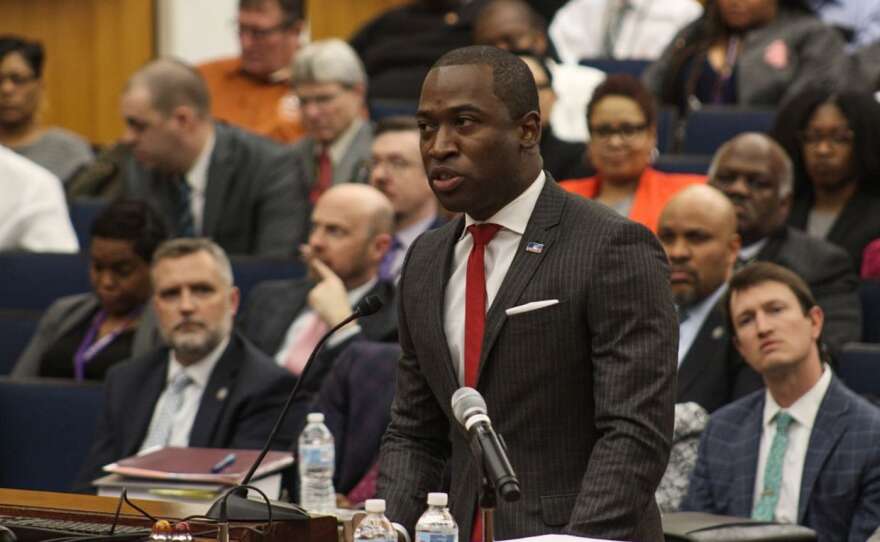After months of tense negotiations over next year’s budget, Richmond City Council and Mayor Levar Stoney seemingly reached a compromise on Monday. The proposed budget includes Stoney’s request for increased funding for Richmond Public Schools and road repaving, but rejects his proposed 7.5 percent property tax hike. A majority of council members said they wanted to avoid further burdening residents after taxable home values in Richmond had already increased. Instead, City Council cut funding for vacant positions at City Hall and for capital improvement projects like park renovations.
WCVE’s Roberto Roldan sat down with Stoney following Monday’s meeting to discuss the budget compromise:
Roldan: “So let's just start off by explaining a little bit about the budget that you proposed earlier this year. It included new money for schools and roads as well as a property tax increase. Is that right?”
Stoney: “That's correct. We proposed a budget that was based on equity and justice. And there's three things that we recognize right away and that is the budgets in the past decade, roughly, have been built on a deferred maintenance, on disinvestment and also on dishonesty. The city leaders in the past have told a number of our residents that we could deliver a high quality service for less dollars and with less people. And frankly, that's just wrong. This budget was created to right those wrongs. So in that budget you saw $37 million more for a public education to fund the Dreams4RPS strategic plan. Within that was a raise increase for our teachers and our staff. I was very, very pleased to include also $16.2 million for road repairs around the city. We have a city that is suffering from failing infrastructure. There's potholes that are littering many, many neighborhoods, and so we put $16.2 million there, quadrupling the budget for road repairs. We funded this budget through rolling back the recession-era tax cuts that were in place in 2008, from a $1.20 per $100 on the tax rate to $1.29. That's the budget in a nutshell, and we think it is a budget based in equity.”
Roldan: “And your proposed property tax increase would bring Richmond's rate, like you said, to $1.29, which is higher than the 95-cent rate in Chesterfield or the 87-cent rate in Henrico. But you've argued that it's unfair to compare Richmond to the surrounding counties. Why is that?”
Stoney: “Comparing Richmond to Henrico and Chesterfield is like comparing apples to oranges. The State [of Virginia], alongside VCU and other tax exempt entities, occupy 30 percent of Richmond's land. That means we miss out on $50 million in revenue each and every year. And then you add the fact that Richmond has a 25 percent poverty rate, it provides a different burden on city services that our friends that Henrico just don't have to deal with.”
Roldan: “The property tax increase has been probably the most controversial part of the budget, right? That's what residents voiced concerns about at your budget town halls that you’ve hosted throughout the city. But city council has now actually voted to remove that from the budget?”
Stoney: “Yes, my budget has made some people a little bit uncomfortable in City Council, because, since it has been a budget base and equity and justice, I think they've missed the fact this budget has been about investments. But nonetheless, we currently are at the lowest tax rate in the city's history at $1.20. In 1988, when I was seven years old, the tax rate was $1.53. In 1980, when I was a twinkle and my mom and dad's eyes, the tax rate was $2.12. But we have been disinvesting in public education, disinvesting in our roads and now it's time for an investment.”
Roldan: “So now Richmond City Council seems poised to approve a budget that has your proposed investments in schools and road repaving, as well as the teacher pay raises. It balances that out by cutting $7.5 million in capital improvement projects rather than the increase in property taxes. What do you think of this compromise?
Stoney: “I would rather obviously have everything that was in my proposed budget. However, budgets are about the art of compromise. We did not have at our disposal, at the time of crafting this budget, those new revenues that were coming out of the City Assessor's Office, those new projections. They were privy to that new revenue, and so they were able to eliminate the need for the new revenues coming out of tax collections from a real estate tax. I think it's still a victory for the City of Richmond at end of the day, because all the investments that I proposed are protected.”
Roldan: “It strikes me that one of the things that is different between the budget that City Council may approve and the one that you proposed is it doesn't include a new recurring revenue stream like a property tax increase. So I'm wondering, if city council's budget passes, are we going to be in a position next year where we're going to have to debate this all over again, because Richmond Public Schools still needs funding for the second year of its strategic plan?”
Stoney: “The funding that will be in this upcoming budget should be the floor, not the ceiling. Obviously, we can't continue to burden our taxpayers with more and more requests for new revenue. However, I think that we can share the growth in the city. If the city's growing at a great pace and we're receiving the new revenues because of that growth, we should share those new revenues with Richmond Public Schools moving forward.”


